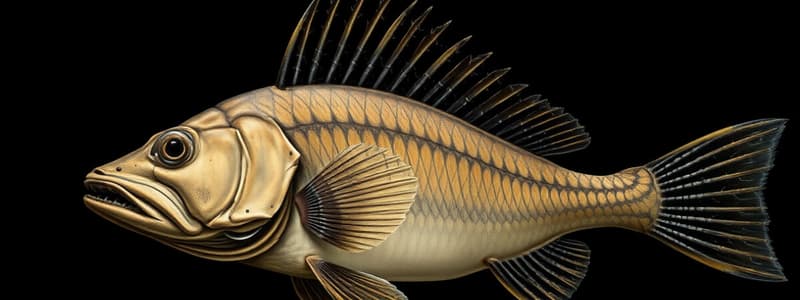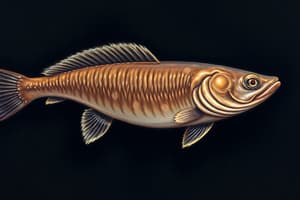Podcast
Questions and Answers
What is the genus of the earliest vertebrate, dating back to 530 million years ago?
What is the genus of the earliest vertebrate, dating back to 530 million years ago?
- Genus Myllokunmingia (correct)
- Hagfish
- Ostracoderms
- Class Conodonta
Class Conodonta existed from 500 to 200 million years ago.
Class Conodonta existed from 500 to 200 million years ago.
True (A)
What are Ostracoderms known for?
What are Ostracoderms known for?
They are extinct agnathans with bony plates forming external armor.
What is a defining feature of Lamprey based on their order petromyzontiformes?
What is a defining feature of Lamprey based on their order petromyzontiformes?
What notable adaptations do Hagfish have?
What notable adaptations do Hagfish have?
The Agnathous condition suggests a cranium that is probably ______.
The Agnathous condition suggests a cranium that is probably ______.
Match the following definitions to their corresponding terms:
Match the following definitions to their corresponding terms:
How do gill arches develop?
How do gill arches develop?
Study Notes
Genus Myllokunmingia
- Existed approximately 530 million years ago during the Early Cambrian period.
- Considered possibly the first vertebrate.
- Characterized by a cartilaginous cranium and cranial sense organs.
- Featured "Z-ish" myomeres, indicative of muscle segmentation.
Class Conodonta
- Existed between 500 to 200 million years ago.
- Key representative of extinct agnaths.
- Notable for conodont elements, which are tooth-like structures with dentine-like material.
Ostracoderms
- Existed around 480 million years ago, classified as extinct agnaths.
- Considered paraphyletic group.
- Generally small in size, featuring bony plates as external armor covered by skin.
- Bony armor served multiple purposes: mineral storage (calcium and phosphorus), osmoregulation, electroreceptor isolation, and protection.
Lamprey, Order Petromyzontiformes
- Originated approximately 360 million years ago, and still extant today.
- Relatively small size compared to other fish.
- Adults are ectoparasites, primarily feeding on bony fish using rasping keratinized spines on their tongues.
- Ammocoete larvae filter-feed through pharyngeal slits.
Hagfish, Class Myxini
- Existed around 300 million years ago and remains extant.
- Typically small in size with vertebral rudiments present.
- Possess keratinized, tooth-like plates and a cartilaginous cranium.
- Act as scavengers and produce mucin with thread cells for defense.
Agnathous Condition
- Early vertebrates likely had a cartilaginous cranium or braincase.
- Unique oral structure includes a hoop of bone surrounding the oral cavity, derived from the first gill arch.
- Aquatic respiration involves water entering through the hoop and exiting via successive gill openings or slits.
Gill Arches
- Develop from individual cell blocks, not a singular structure.
- Modular design allows for flexibility and folding capability, enhancing function during development.
Studying That Suits You
Use AI to generate personalized quizzes and flashcards to suit your learning preferences.
Description
Explore the fascinating world of superclass Agnatha, which includes jawless fish and early vertebrates. This quiz covers key genera, classes, and important evolutionary traits of these ancient creatures. Test your knowledge on the extinct species and their unique characteristics.




